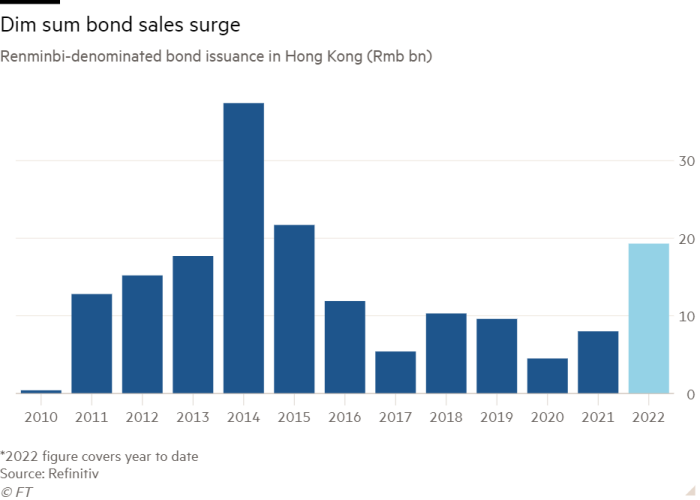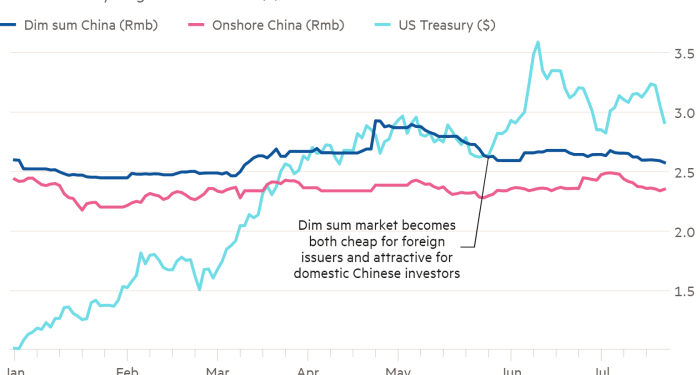Sales of international renminbi bonds have surged this year as the country’s fixed income investors, starved of decent returns at home, take advantage of new market access to snap up higher-yielding Chinese currency debt offshore.
The volume of dim sum bond offerings — renminbi-denominated debt sold in Hong Kong — has risen 145 per cent from a year ago to Rmb126.8bn ($19.3bn), already surpassing the full-year total of 2021, according to data from Refinitiv. That puts the market on track for its best year since 2016.
The revival of Hong Kong’s long-stagnant dim sum market stands in sharp contrast to negative sentiment in China’s market for onshore renminbi debt, which foreign investors have been dumping at a record pace in favour of higher yielding dollar debt.
“The pick up in issuance [of dim sum bonds] is real,” said Becky Liu, head of China macro strategy at Standard Chartered.
On the demand side, Liu said mainland Chinese investors were taking advantage of the Southbound Bond Connect scheme, which launched late last year and allows China’s domestic financial institutions to access bonds traded in Hong Kong.
That includes dim sum notes, which offer a yield premium compared with China’s domestic fixed-income market, in which easing measures to combat an economic slowdown have depressed bond yields.
And while international investors are swapping their holdings of renminbi bonds for dollar debt, China’s capital controls leave its domestic bond traders with far fewer options, making the dim sum market an attractive source of juicier returns.
Meanwhile, a series of sharp rate rises by the US Federal Reserve has pushed dollar bond yields above those on equivalent dim sum debt, incentivising more foreign financial groups to raise renminbi funding in Hong Kong that can be used for trade financing and other purposes.
“One of the previous hurdles for getting renminbi for invoicing to support trade financing and other uses was high interest rates but that story has now flipped — the cost of renminbi financing is cheaper than for the dollar,” Liu said.

That increase in offshore renminbi fundraising also comes alongside signs of an uptick in trade deals settled in renminbi. In June, India’s largest cement producer UltraTech adopted China’s currency to pay for imports of Russian coal.
“The dollar is still the dominant currency of global trade but we do have a number of examples pointing to a potential rise in renminbi-denominated trade settlement,” Liu said.
And while most dim sum bond sales this year have come from the international arms of China’s largest banks and financial institutions, Refinitiv data show foreign issuers accounts for roughly a fifth of total fundraising.
Policy banks from countries including Germany, South Korea and Sweden as well as the World Bank have all tapped the market this year, as have lenders from commodities exporters to China, such as National Australia Bank and Malaysia’s Maybank. A handful of corporates have sold dim sum bonds, including Hong Kong property group Wheelock.
China’s finance ministry has also signalled high-level support for the market’s growth with the sale of Rmb7.5bn in offshore bonds in three tranches last month and has announced plans to tap the market for a record fourth time later in the year.
Investors said the Southbound Bond Connect programme had also spurred more interest among Chinese issuers in selling offshore renminbi debt, with property developer China Vanke raising Rmb500mn from a dim sum deal last month.
“Mainland companies who issue offshore bonds on a regular basis now find it’s cheaper to issue dim sum bonds than dollar bonds,” said a senior fixed-income investment manager with a foreign lender based in Shanghai. “And it’s natural for [Chinese] investors to seek assets with higher yields in the offshore markets.”
But he added that Chinese financial institutions were still required to flag any planned purchases or sales through the bond connect to the country’s central bank and foreign exchange regulator days in advance. The precautions are part of a regulatory hangover from 2016, when a renminbi rout forced Beijing to impose strict capital controls.
“Outflows are still closely watched by the PBoC and the State Administration of Foreign Exchange,” the investment manager said, referring to the central bank, the People’s Bank of China. “They don’t want any added volatility.”











